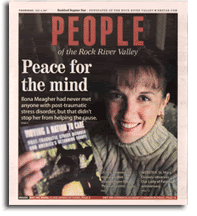'Moving a Nation to Care' Featured in Rockford Register Star
 My local paper runs a feature story on my work today. A very nice piece, which includes a Q & A and a couple of recently-taken photos.
My local paper runs a feature story on my work today. A very nice piece, which includes a Q & A and a couple of recently-taken photos.
From the Rockford Register Star:
Ilona Meagher had never met anyone with post-traumatic stress disorder. She didn’t have any family members returning from Iraq, and she didn’t have military training.
In other words, there was no particular reason Meagher, a former flight attendant who lives in Caledonia, would become a passionate advocate for American soldiers struggling to adapt to life after war.
Except she saw the issue for more than its statistics. She did more than read a newspaper article and think, “Such a shame.” Rather, this 41-year-old envisioned the families torn apart by soldiers who, unable to cope with their memories of Iraq, took their own lives.
In educational interest, article(s) quoted from extensively.
Continuing:
Q: How does post-traumatic stress disorder affect soldiers differently today than it did in previous generations?
A: Biologically, there is a physical need for soldiers in combat to be able to protect themselves and defend their battle buddies. They do this by attacking the enemy.
That’s easy to do if the enemy is clearly marked and standing opposite you, pointing a gun at you. Traditional battlefront soldiers got an outlet to the stress that built up in their bodies. The act of literally squeezing the trigger of their weapon offers a very real physical release to stress that a lot of our soldiers today in Iraq and Afghanistan don’t get.
When an (improvised explosive device) blows up a convoy on the side of the road, who do you fire at? There’s no one there, and if the enemy is there, how do they know who they are? They’re not clearly marked; they’re wearing the same civilian clothes as the rest of the residents in the area. So, physically, today’s soldiers don’t have a way to release their natural, physical stress when they’re attacked.
Q: What is particularly tough about today’s battlefield for soldiers?
A: Mentally, it’s a whole different matter. Unlike Vietnam, where there was a lot of guerrilla fighting, a lot of Iraq’s firefights and attacks take place in urban areas. There are tons of innocent people milling around.
That means there’s a lot of collateral damage. And there are a lot more chances for mistakes to happen that can really do a number on troops. For example, if a car is racing toward you at a checkpoint, and it will not stop — troops have to defend themselves and fire at the vehicle. Sometimes, the vehicle is filled with families and not terrorists; they just simply misunderstood the instructions and wound up dead.
While this type of accident is stressful in the field, usually this is the kind of situation that ends up returning to haunt troops once they’re back home with their own families.
When things have quieted down, and they’re alone with their own thoughts, these are often the types of incidents that they can’t push down.
Q: How do you believe your work is making a difference to American soldiers?
A: I think the greatest need that my book fills is the need for troops and military families who are dealing with combat post-traumatic stress disorder to hear that at least some of us civilians are paying attention.
Many complain that they go off to experience the most powerful event in their lives, that they are fighting for their country, and then when they come back home, most of us seem to care more about Britney Spears or Paris Hilton. They don’t hear us talking amongst ourselves about the war. They don’t see us showing all that much concern about their issues and needs. It can be pretty demoralizing for them.
Q: Why should the American public care more about post-traumatic stress disorder?
A: Society has a responsibility to open its heart to these issues, but far too many of us are too busy living our lives as though we’re not at war. That attitude — which has been conditioned in us by our leaders who refuse to ask anything of the American people — can make military families feel abandoned. … Without a united effort by the majority of the citizens of this country, we’re just going to keep hearing of more and more troops slipping through the cracks.
Q: What has been the most rewarding aspect of your work?
A: Hearing from the troops and military families, as well as seeing that other citizens who don’t really have any skin in the game care enough to come into the fold with us. That’s really exciting to see.
I would love to find others, preferably in the area, who might want to help with the project because there’s always so much to do, and never enough of us to do it. There’s no money in it, the work is often thankless and difficult, but it is rewarding in so many ways.
Read the whole piece for more...

Related Posts


